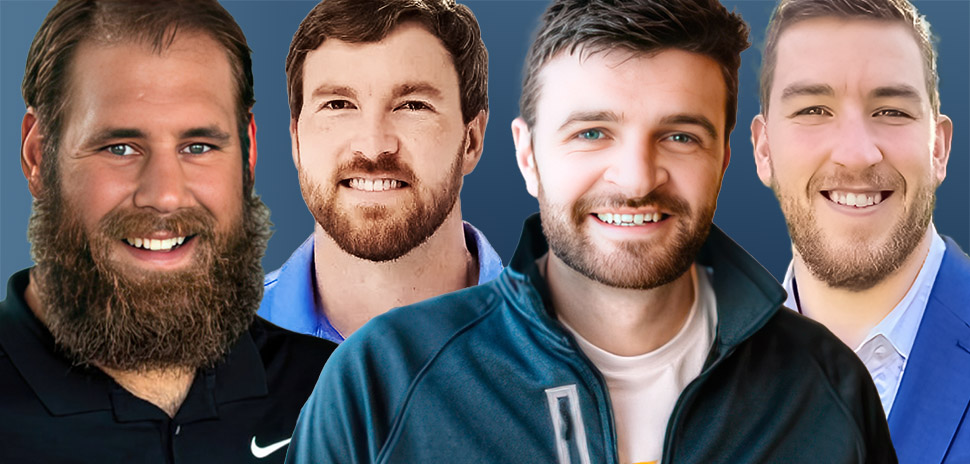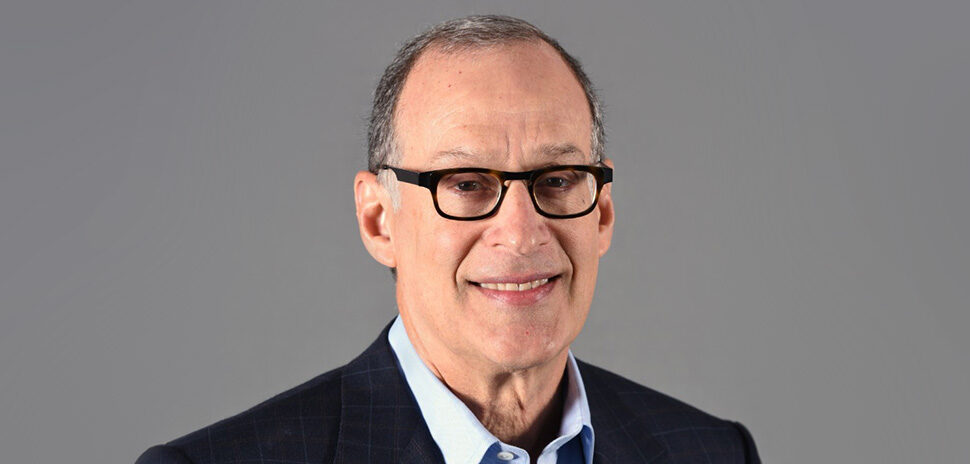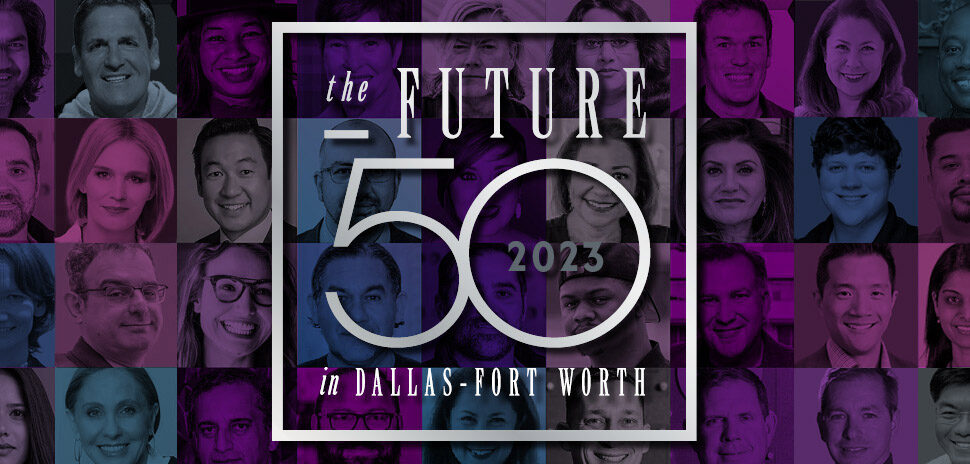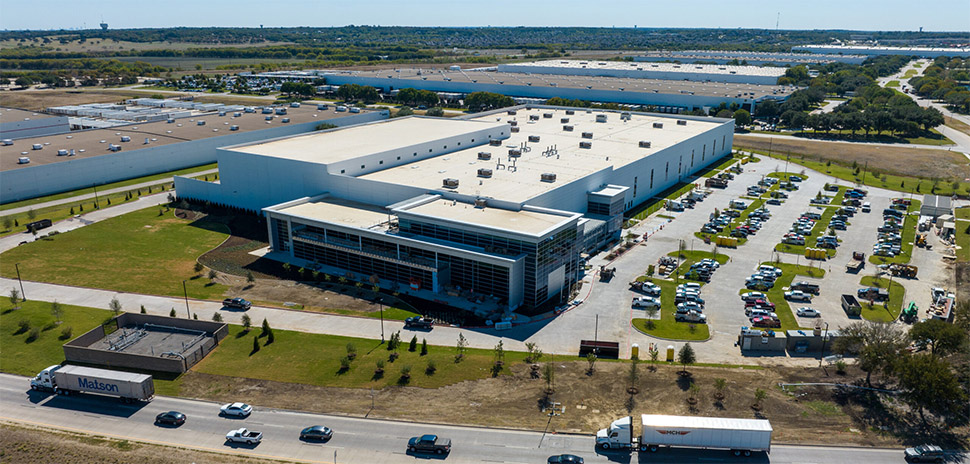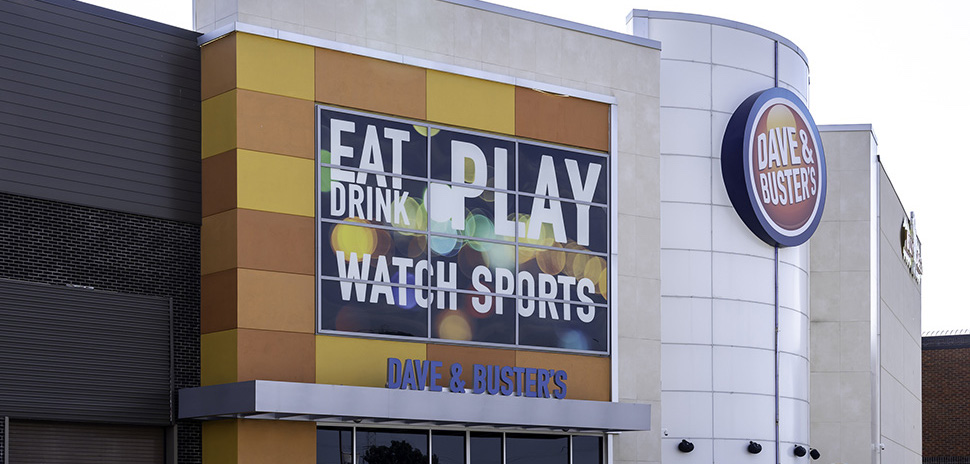Former athletes entering the startup world may have a leg up leveraging personal attributes such as discipline, focus, perseverance, and working hard and well as a member of a team. But they also face their share of challenges, like overcoming unfair stereotypes.
Those were some of the key takeaways from a recent Dallas Startup Week panel discussion featuring four athletes who’ve also founded or co-founded technology startups.
The freewheeling conversation was moderated by Adam Redmond, who played football at Harvard University before becoming an offensive lineman for several NFL teams, including the Dallas Cowboys. Redmond is the CEO and co-founder of Tully, a McKinney-based platform for building and managing customized strength and training programs for athletic teams. Joining him on the panel were three founders—Brendan Sullivan, Jason Fox, and Travis Frederick—who also have successful backgrounds in sports.
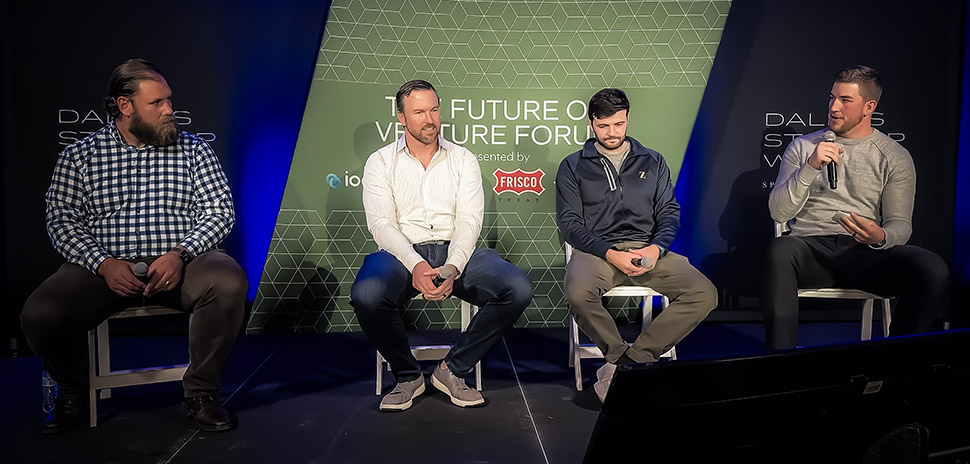
From left: Travis Frederick, Jason Fox, Brendan Sullivan, and Adam Redmond. [Photo: Dallas Innovates]
Frederick, who was selected for five Pro Bowls as a center for the Cowboys from 2013 to 2020, is the co-founder and CTO of Demiplane. Based in Green Bay, Wisc., Demiplane is an online platform providing digital tools and services for gamers in the tabletop role-playing industry.
Fox, formerly an offensive tackle for the NFL’s Miami Dolphins and Detroit Lions, is the founder and CEO of Earbuds, a real-time music sharing app that lets audiences stream the playlists of athletes, entertainers, and each other.
Sullivan, who captained the men’s track and field team and competed in the pole vault at Yale University, is the CEO and founder of ZAMA Health. Washington, D.C.-based ZAMA, an inaugural member of the Techstars Physical Health Fort Worth Accelerator, is a sports psychology and mental health platform for collegiate athletes, gym members, and fitness enthusiasts.
Redmond opened the discussion by asking each of the athlete-founders to tell how their entrepreneurial journeys began.
Game on
Tell us about your current startup ventures.
BRENDAN SULLIVAN: We started a sports psychology, mental health platform that’s really focused on the athletic community. I ran track in college and we had a lot of issues on our team, like eating disorders and depression. The year after I graduated, one of my teammates died by suicide. So, our company actually partners with athletic departments and the gym and fitness community to provide access to things like self-guided modules, peer-to-peer support, connecting you to other individuals with similar issue areas and backgrounds—as well as to a clinical network of psychiatrists and therapists who’ve been trained on the needs of the athlete community. We’re trying to make these things more affordable, but also really more ‘approachable’ for this population, especially for men, who I feel don’t really feel like they have a place that fits them.
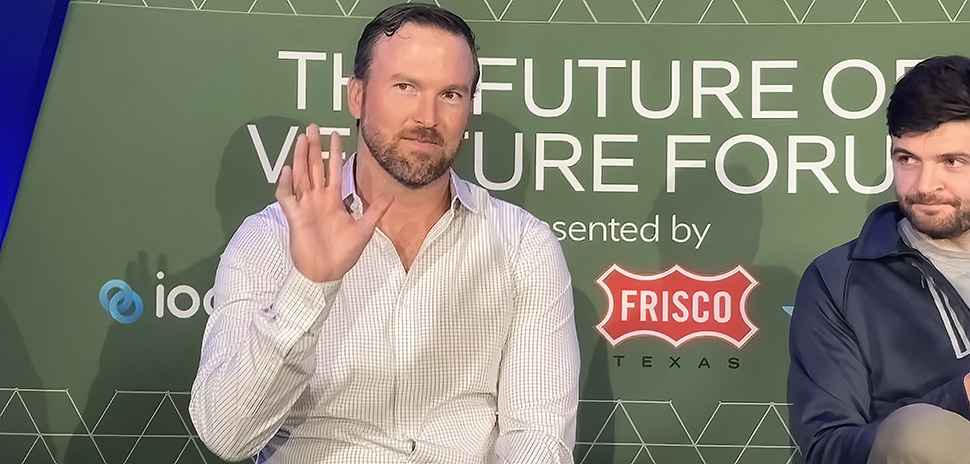
JASON FOX: The original idea for Earbuds came from my very first NFL game in my second season, when we were playing the Carolina Panthers and Cam Newton, who had just been drafted one-one overall. I was doing a very boring pregame warmup, and Cam was five feet away from me with his beats on and he was dancing and getting himself amped up, getting his teammates into it, getting the crowd amped up. At first I was just curious what he was listening to. But more than that, I thought, ‘Man, there’s 80,000 people here and millions more watching at home, and Cam’s an individual with millions of social media followers. How many other people would love to be in his headphones right now?’
It was an idea that grew as I saw more and more opportunity, with every athlete with their headphones on before games. Turn on the TV with any sport—the NBA, it didn’t matter—and you’d see that. With Michael Phelps, the Olympics champion swimmer, what he was listening to before his race was the No. 1 thing trending worldwide on Twitter, and I thought, man, if that’s not a signal from the market, I don’t know what is.
So, we went out and partnered with the four largest streaming services and created a provider-agnostic, real-time solution where athletes, or just your own friends, co-workers, significant others, can broadcast their playlists and people can tune in live and listen along with them. We’ve had 500 NFL athletes—names like Patrick Mahomes, Baker Mayfield, and Robert Gronkowski—that helped make that vision a reality, which was really cool.
TRAVIS FREDERICK: When you’re a professional athlete, there’s so much stress on you at all times throughout the year. Even in the off-season there’s not really a break, because you’re always trying to stay up and be better. You know that, at some point, somebody’s going to come behind you and take your job. That happens to all of us, unfortunately.
So, for me, my escape was these tabletop role-playing games. And I realized there was just no digital support for it. It’s a very analog thing. Why? Why in the fast-growing world of gaming is this still happening in books and on paper? We started looking into it a little more and found there just was no support out there for it. So, we entered into a situation where there were no other people doing this. And we decided that we were going to be able to digitize these physical books, make it way easier to play, get a lot closer to video games from an adoption-time standpoint, and allow other people to have that escape, too.
It’s a really interesting type of game where you’re role-playing. Part of being in role-playing is that you have to empathize with your character. So, in my opinion—and I might be a little biased—I think the world is a better place when people play more of these games. Because as you’re playing these games—as a young kid, or even as you’re getting older—you have to put yourself in somebody else’s shoes, you have to learn how to empathize with other people. And in today’s day and age, that’s something that may be on the decline. So to me, finding a way to digitize this makes it a lot easier for younger people to jump in and expand the market, to help find an escape that’s not necessarily just video games. So, we decided I’d retire and jump into it.
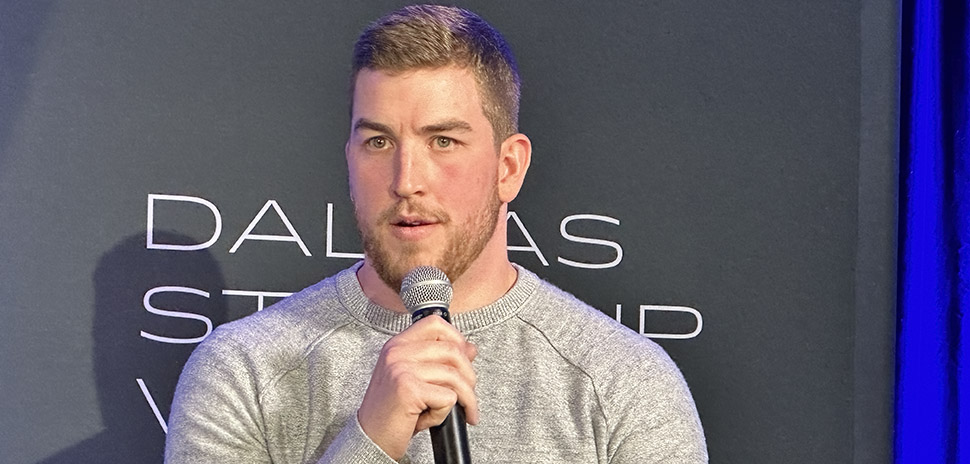
Adam Redmond [Photo: Dallas Innovates]
REDMOND:
Having an idea is one thing, but having the foresight, the vision, and the determination to execute on that idea is a totally different story.
Travis, let’s kick off this aspect of the discussion with you, because I was lucky enough to be your teammate on the Cowboys and worked with you every day. If you drove past the Cowboys headquarters at 5 a.m., you would see one car in the parking lot, and that was Travis’s. Even after all the Pro Bowl appearances, he was there at 5 a.m. I think whatever sport you play, you realize that that commitment, that discipline, is crucially important to any type of success. And I would argue that’s the same approach you need in business. Travis, how did that serve you as an athlete—and how have you rolled that into Demiplane?
FREDERICK: As a professional athlete, you are your own product. You belong to a team via the contract, but you are your product. So, if you’re not constantly working on your product, much like in a startup, you’re not going to be able to be successful. For me, just to let things ride out and just be ‘okay’ was never an option. When I was young, my dad always said, ‘If you’re going to do something, do it the right way.’ So I always wanted to do it the right way.
I think where some of it gets moved around a little is, as a professional athlete, the other thing you have to learn is compartmentalization. This is a terrible thing to say, but when you walk through the door, there was always a saying about dropping your baggage with the security guard. Whatever happened at home, or whatever is happening in your life, goes away, because when you’re there you have to be there for your team. You have to be there for your group to be able to get better. So, for me, getting there early was a way for me to take advantage of my time in a useful way. I could be in the hot tub, or in the weight room, before anyone else. And when everybody else was not really excited about doing that after practice, I was already done. And I was upstairs on my phone, working with the developers.
The discipline allowed me to work on my craft, become an All Pro, be consistent in the NFL, and be able to go to Pro Bowls over and over. It also allowed me to start [the Blocking Hunger Foundation] and be able to feel like I’m really spending good time with my kids and my wife on top of all the rest of the work.
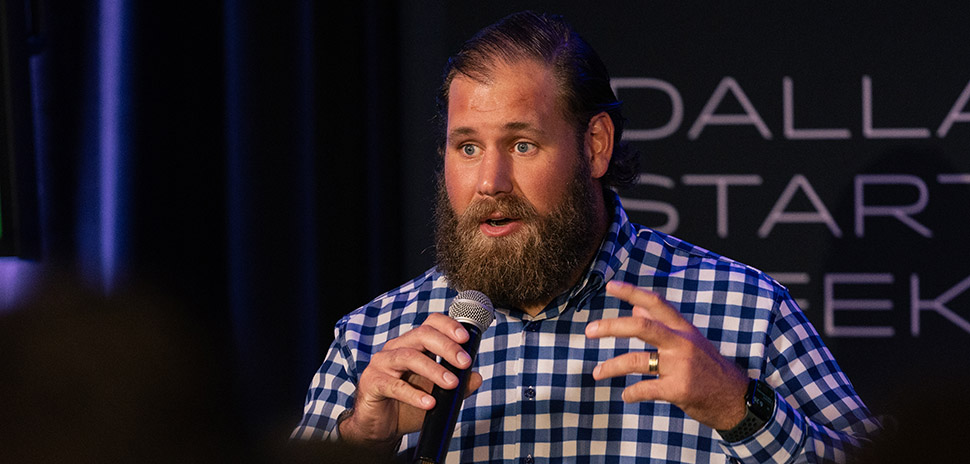
Travis Frederick [Photo: The DEC Network]
REDMOND:
Being focused and task-oriented plays directly into the athletic experience.
In football, Monday of game week you have a task at hand that you need to do by 5 o’clock, then you’re ready for Tuesday, and on and on. Speaking from my own experience, that’s the way our company Tully has gotten off the ground. There’s too many things to look at all at once, so you have to be able to break it down, look at what the next hours, the next day are going to be. Jason, what are some of the things you did early on with Earbuds to stay task-minded, to go from zero to one?
FOX: There’s so many carryovers from athletics to the world of startups. I joke with people all the time that I used to think professional football was stressful, but startups have a way of humbling you, too. You could be on cloud nine one day and then something bad happens—the deal didn’t go through, or your investor backed out. I think a lot of those life lessons you learn in sports help prepare you for adversity. In the football world, there’s injuries that you deal with every season, there’s bad games or losses or changing coaches or changing teams, or allowing a bad play and then you’ve got to quickly move on and not let that become multiple bad plays in a row. So, being able to quickly process where you’re at is important: Okay, that didn’t work out, but we need to reassess, figure this out, attack this from a different angle.
You know, before we even started a company, I was trying to get hold of Spotify, Apple Music, Pandora, Amazon—the companies we [would eventually] partner with. Being a professional athlete helps to knock on the door, but it doesn’t help to get the deal done right away. I had to bird-dog 20 people from Spotify to get to the right people. And even when you get there, it’s, ‘Well, what do you know about tech? Why is your idea going to work?’ So, it’s important to be able to process those things and take the wins from the losses and—to be extremely corny now—to keep getting first downs, to keep moving the ball forward.
REDMOND:
In track and field, Brendan, you didn’t have 65 plays a game to get it right, like we did in football.
For you, it was a few vaults in a few moments—can you talk about being in the spotlight with that type of now-or-never deal, and how that applies to business?
SULLIVAN: Sure. I’ve always been fond of the quote that luck is ‘opportunity meeting preparation.’ And I think two big attributes that go into that are focus and persistence. Focus is setting goals for yourself long- and short-term, holding yourself accountable, pivoting if something changes; then, persistence to just keep going. Most athletes at some time have injuries in their career, there are kinds of isolating and lonely things that happen, there’s financial stuff involved. And there’s a lot of parallels to that in the startup world. I think you need to stay focused and not get too ahead of yourself.
I agree that persistence is really the key thing in the startup world, because it is a lonely time, it is very unmotivating. And I think athletics teaches you that sometimes you just have to put your head down and deal with shit—get through the next day and just keep moving on.
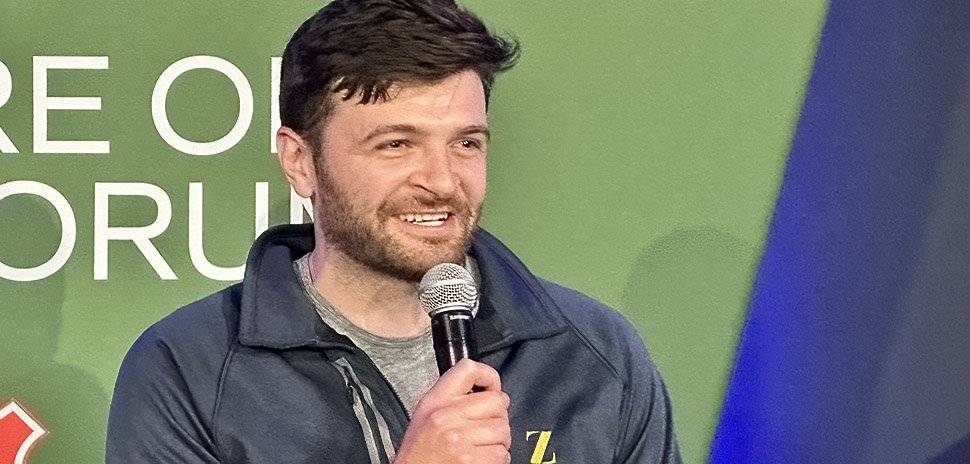
Sullivan [Photo: Dallas Innovates]
REDMOND:
I couldn’t agree more. For me, something that got me through that was working in tandem and collaboration with my teammates.
Speaking as an offensive lineman, you’re one of five—you’re one piece of the puzzle that’s leaning on the others to do their job; if they don’t, you could be in a world of hurt. But I think that teamwork is an amazing gift, especially for the startup journey. Brendan, could you jump back in and talk a little about teamwork and collaboration and what you’re experiencing?
SULLIVAN: Even in an individual sport like track, you’re not alone. You have your coaches, your athletic trainers, your teammates you rely on for assistance every day. As I think about teamwork in a professional sense, at the end of the day companies are just a collection of individuals. And it’s not about just finding the brightest or the best people, it’s also about ensuring that they’re going to be the most effective in their role—and making sure that what they’re doing is working. In life, no one is ever successful on their own. I think if someone tells you that, they’re just a liar or an asshole. But I think having people around you—giving a shout-out here to Techstars, one of the best things we did—having the ecosystem that you all are developing here, having the investment in entrepreneurship, that is crucial and really important for that sense of support. Because you go through some dark times starting a company.
REDMOND:
Travis, could you talk a little bit about your relationship with your co-founder and how you guys fill different roles?
FREDERICK: I’m really fortunate to be part of a team. I don’t know how people do it alone. My co-founder and I are very different people, and we fill two very different roles in the company. I’m always a process-oriented person. When the football coach said, ‘We’re going to do it a different way,’ my first question was always ‘Why? If it’s working this way, why are we going to do it another way? Tell me why it’s a better idea.’ My co-founder is somebody who says, ‘I’m not feeling like doing it today like this; let’s do something else.’ And so our partnership works really well. The way I put it is: I stand on a tower and watch him run as far as he can and come up with crazy ideas and explore things out there. And then I pull him back and say, ‘Hey, what did you learn out there?’ So, it works really well for us.
Whether it’s at the co-founder level or at the leadership level or when it’s your first employees, there’s a way that you have to handle each employee, and teamwork is hugely important. Team is really something I’m passionate about, because, like Adam said, on the offensive line you’re one of five. People ask what made me All Pro, and the first thing I say is, ‘My right guard.’ It has to do with your ability to do your job to the best of your ability and trust everyone around you to do their job to the best of their ability. If everything happens like it should, it all just works the way it’s supposed to. It’s all about finding the right balance of all those things and making everybody work together in unison.
Fortunately in the NFL or other sports you get to practice things. You get less practice when you’re out doing business deals with huge corporations and you’re trying to figure things out. But it’s always about quickly, rapidly moving through those situations and saying, ‘Okay, I made a mistake here. How can we recover from that and move on, and always be moving forward?’
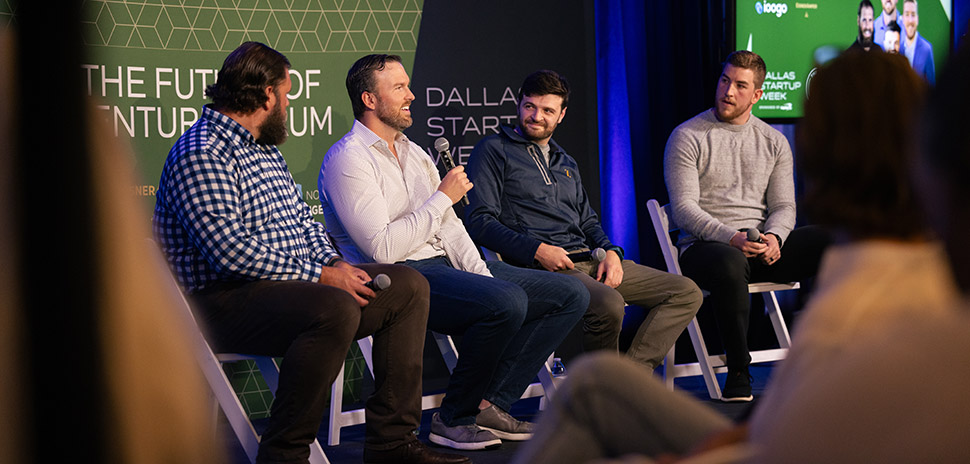
Travis Frederick, Jason Fox (speaking), Brendan Sullivan, and Adam Redmond [Photo: Dallas Innovates]
REDMOND:
I think what you’re hitting on is trusting the process and each other, and when you’re facing adversity in business, the need to be persistent. The other thing that’s important is knowing your role.
I was a reserve offensive lineman, a backup, an undrafted player out of the Ivy League, and my goal was to stick around and find a role to know what I was good at and know what I wasn’t good at. Applying that to the startup life, you need to know your role. You have to be okay saying I don’t have the answer, but be able to find the people who do have the answers. Jason, you’ve alluded to needing to pivot and make changes with your company. How did you approach that?
FOX: We have a head of product, a head of engineering, and myself kind of overseeing everything. And it’s not super infrequent that we disagree about something. Hey, we’re going to launch this new feature and design wants it to look this way, but engineering says, ‘Well, if we did it this way, it would be 10 times easier to build, but would that fit with what we’re selling our partners, what we’re marketing?’ Figuring that out and working within the team is what being a teammate is: coming together for a common goal. Sometimes it takes conversations to work things out, and sometimes it takes making tough decisions and saying, ‘You know, that’s not what’s best for the team right now, so I need you to be on board for this.’ You need to be able to communicate that effectively while still making your teammates or employees feel that they’re heard and are still playing a really positive role.
REDMOND:
Any athlete will know, if you have a coach, it’s a little bit about swallowing your pride and not being afraid to take constructive criticism—even though it might not be what you want to hear.
But, Brendan, you have a unique experience compared to us, in that track and field is an extremely technical sport, right? And if your steps or your aim are off just slightly, you can totally [mess up] your performance.
SULLIVAN: In athletics, there’s usually kind of like a playbook for stuff. Obviously, innovation happens and people do different things—like in track, stuff like diet and training are customized based on the athlete—but there really is a framework. And I think company building is kind of the opposite. If you follow the same framework, it’s probably not that innovative of a company. So, I think what actually is a differentiator in business from athletics is not necessarily following these playbooks. You take advice from mentors and investors, sure, but at the end of the day you really have to go toward the innovative path. And if it doesn’t work, you can pivot and change it.
At the same time, the one thing that does go with athletics is, it teaches you not to take stuff personally from a coaching standpoint. When you’re talking about pitching investors or getting no’s, I always equate it to dating. You’re trying to get the pretty girl in class. Eventually you’ll probably find her, but there’s no’s involved there too, and you can’t take it personally.
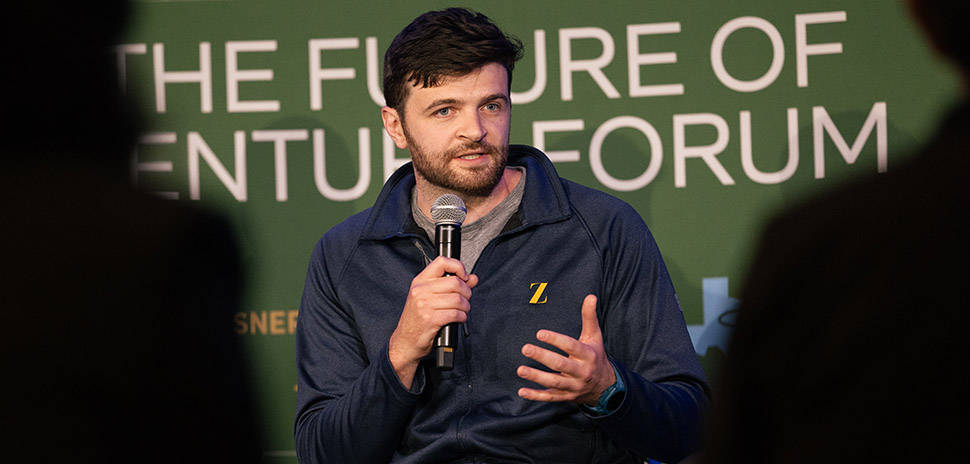
Brendan Sullivan [Photo: The DEC Network]
REDMOND:
That’s a terrific point. So far we’ve talked about a lot of the positives from sports, but I’d love to hear about some of the negatives, the bad habits, you took from sports into business.
For me, it was instant gratification—learning a play on Monday, practicing on Monday afternoon, and if I mess it up, I get to go do it again tomorrow, and if I get it right, we move on. But now, with our company, we sit and we look at a whiteboard for months on end and wait for something positive to happen. That was my biggest challenge: I want customers today, I want investors tomorrow. Travis, how about you?
FREDERICK: One thing for me was the preconceived notions you have to fight against. People generally think of offensive linemen and say, the bigger the neck size, the lower your IQ. I fought against that my entire career, because my neck got pretty big there for a while! But now, you go into a room as a tech startup and this person’s former Google, this person’s former this, and they have all these accreditations, and I have none—I played in the NFL and got a double major at the University of Wisconsin. That makes it difficult to say, ‘Hey, I’m qualified to take your money and do something cool with it.’ But, on the flip side, I have a lot of unique experiences and mentors and investors and people who’ve helped me learn things along the way. So while being an athlete has helped me in some ways, like opening doors, it can make it difficult when you get down into some of these really hard business discussions.
FOX: I’ve battled that, too. We’ve been able to steal people from Apple and Dropbox and some really big companies, but, in the early days, when you have zero traction and haven’t raised a dime yet, you’re like, ‘Hey, I have this really cool idea.’ And people look at you like you’re a dumb lineman and think, Why would I trust you to be able to pull that off? But when you’re able to get over that and get something going, they kind of see your sports background as a positive, like, ‘This person is used to adversity and taking on challenges and working hard.’ But, there’s definitely that ramp-up.
END ZONE, A QUESTION FROM THE AUDIENCE:
Travis, how do you feel playing tabletop games makes you a better entrepreneur and founder?
FREDERICK: It’s all about exploring and finding different places. For those who don’t know, tabletop games are role-playing games where one person is in charge, and then you live in their world and there’s a group of people that are going to explore through that world. So, as an entrepreneur, you’re not always in control of your world, believe it or not—there’s also investors and partners and all of that. So, your job is to take the situation that’s in front of you and do your best with it. Often, my favorite thing to do in role-playing games is take it in an unconventional way—go around the side, or try something different, because there’s chance involved in it. Having played these games, what helps me as an entrepreneur is thinking about situations from a lot of different perspectives and saying, ‘Hey, this could be a different way of doing it. We don’t always have to go fight the bad person; we could put them to sleep, or convince them to come over to our side.’ So, my best piece of advice is to try to think about every situation in as many ways as you can, and then go do your best.
REDMOND: I’ve spent a lot of time with Travis, and he’s never lit up as much about blocking linebackers and defensive alignment as he has about role-playing games. So, I think he’s on the right path! Thanks to all our panelists for being here and sharing.
![]()
Get on the list.
Dallas Innovates, every day.
Sign up to keep your eye on what’s new and next in Dallas-Fort Worth, every day.










